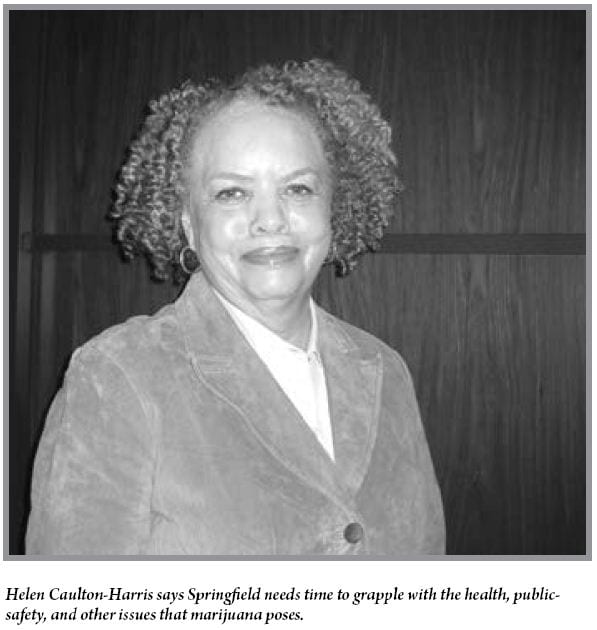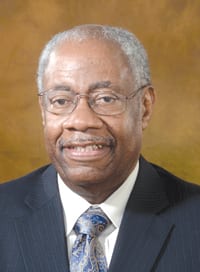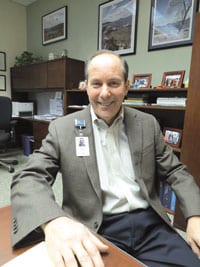Grass Roots Effort – Medical Marijuana Poses Business Opportunities — and Concerns
One year ago, marijuana use was illegal in Massachusetts. Now, it falls under the category of economic development.
“It’s a business opportunity,” said Dr. Ronald Dunlap, president of the Mass. Medical Society. “In Maine, this is a more than $300 million industry, and that’s a small state.”
Those financial opportunities come in several forms. In January, the Mass. Department of Public Health (DPH) will choose up to 35 applicants — from a field of 158 — to open marijuana dispensaries for patients who have been certified by their physicians to use the drug.
At the same time, Internet entrepreneurs have been popping up as well.
“There are online services starting up where, if you pay $250, they will find you physicians who will certify you,” Dunlap said. “The people doing this are simply business people with money who are investing.”
But such activity poses issues with the medical-marijuana law, which was written to ensure that doctors can certify only patients with whom they have an established relationship.

And that’s just one point of confusion surrounding the new law, which is why at least 130 communities have placed moratoriums on marijuana dispensaries until they can work out the myriad zoning, housing, and public-health issues posed by such a sea change in the Bay State’s drug norms.
Helen Caulton-Harris, Springfield’s director of health and human services, explained that the city’s moratorium will give it time to develop a broad strategy for addressing the ancillary issues that have arisen with the legality of medical marijuana.
For example, “the law does not give immunity under federal law or obstruct federal enforcement of federal law,” she explained, nor does it supersede Massachusetts General Laws prohibiting the possession, cultivation, transport, distribution, or sale of marijuana for non-medical purposes. In addition, she noted, the new law requires no accommodation of the medical use of marijuana in any workplace or, in fact, accommodate smoking marijuana in any public place.
“The city must have the time to study the public-safety implications and whether additional resources are necessary,” she continued. “While I am appreciative of the thoughtful process of the state Department of Public Health and was a member of the state Public Health Council when these regulations were passed, the implications will directly impact our residents and perhaps our quality of life. In addition, on the local level, there must be a process to educate the residents about the potential impact of the regulations.”
Business Plans
What is clear is that serious money is at stake, which is why the state has set significant financial barriers for entry into the marijuana market.
Specifically, a company that wants to open a dispensary would be subject to $50,000 in annual renewal and registration costs, as well as a yearly $500 registration fee for each of its employees. Applicants also had to make a $1,500 payment for the first phase of consideration, and a $30,000 payment for the second phase. In addition, the state is requiring potential business owners to have $500,000 cash on hand.
“This is a very competitive process, and we required applicants to meet high standards to advance,” DPH Commissioner Cheryl Bartlett said after the initial field of 181 applicants was trimmed by 23 earlier this month, mainly due to incomplete applications or insufficient capital. “We are fortunate that Massachusetts has a large field of serious applicants who are capable of making a significant investment to benefit qualified patients and safeguard communities.”
Each county in the state will be assigned at least one dispensary, but no more than five, with the total capped at 35 statewide. Twenty-two applicants are currently vying for sites in Hampden, Hampshire, Franklin, and Berkshire counties. Once licenses are approved early in 2014, it will take at least 120 days for a dispensary to open — hopefully giving cities and towns time to work out their issues and lift their moratoriums.
And those temporary moratoriums are now in place in at least 130 communities, including Agawam, East Longmeadow, Longmeadow, Ludlow, Hadley, Hampden, Hatfield, Palmer, Springfield, West Springfield, Westfield, and Williamsburg — and they typically apply to not only sellers, but home cultivation of marijuana, which will be permitted under certain circumstances for certified patients who lack easy access to a dispensary.
Unlike many of the other 19 states that allow medical-marijuana dispensaries, the Massachusetts law includes what’s known as ‘hardship cultivation,’ allowing certain individuals to grow their own marijuana — specifically, those who are physically unable to access reasonable transportation, demonstrate verified financial hardship, or lack a treatment center within a reasonable distance of their home.
“The city of Springfield needs to vet the potential impact of this section of the regulation on our residents as well as housing,” Caulton-Harris said. “Our thought process must include the impact on neighborhoods and mitigation strategies.”
To be assigned a dispensary license, entrepreneurs will have to prove to the DPH that their business plan is in compliance with all municipal regulations, ordinances, and bylaws. They are required to grow the marijuana they offer for sale, and they may also sell edible forms of marijuana.
The DPH noted that applicants will be evaluated on their ability to meet the health needs of patients, site appropriateness, geographical distribution of dispensaries, local support, and public-safety assurances.
Who Will Be Certified?
Patient and physician eligibility rules run in the thousands of words, but at their heart, a patient may use marijuana for medical purposes only after receiving written certification from a doctor of a debilitating medical condition — defined as cancer, glaucoma, positive status for HIV, AIDS, hepatitis C, ALS, Crohn’s disease, Parkinson’s disease, multiple sclerosis, or another condition as determined in writing by the certifying physician.
‘Debilitating’ is defined as “causing weakness, cachexia, wasting syndrome, intractable pain, nausea, impairing strength or ability, and progressing to such an extent that one or more of a patient’s major life activities is substantially limited.”
As for physicians, they are required to conduct a clinical visit before issuing a certification, must complete and document a full assessment of the patient’s medical history and current medical condition, must explain the potential benefits and risks of marijuana use, and must have a role in the ongoing care and treatment of the patient.
In addition, physicians may not issue a certification for themselves or their immediate family members, and certifying doctors — as well as their family members and employees — may not have a financial interest in a dispensary, receive anything of value from a dispensary or any person related to the dispensary, or offer a discount to a qualifying patient for using a particular caregiver or dispensary.
If those standards are met, physicians may certify for up to a 60-day supply, which is defined as 10 ounces of marijuana. If a physician determines that a patient needs more than 10 ounces during that 60-day period, he must document the amount and rationale in the medical record and in the written certification.
It’s the language defining a bona-fide relationship that concerns Dunlap — or, rather, the potential skirting of that language, which the Mass. Medical Society (MMS) lobbied to include in the law.
“Let’s set aside the controversy over the indicators, and let’s assume there are five or six acceptable indicators,” he said, referring to medical conditions where marijuana would be an acceptable treatment. “People that I call Internet opportunists are essentially getting a doctor or list of doctors they feel will certify patients, and simply inviting patients to pay them money as a finder’s fee.”
Dunlap called it a “second level” of for-profit centers, which essentially say, “‘I will certify you, and you pay us $250.’ Most of it goes to the doctor, the rest to the center to find the physician.”
There are reasons why it’s important that a doctor and patient have an established relationship, he noted, the first of which is a knowledge of the patient’s medical history and the types of medications they’re already taking.
“That’s a big issue. If you wanted oxycodone and your doctor didn’t agree, we would have a problem with you going to one of the pill mills in Florida to get it. You’d be going around your primary-care physician to get a controlled substance,” he said. “There’s a lot of anxiety surrounding the fact that this is a parallel system to the treatment the physician might be aware of. We already have patients taking over-the-counter medications we don’t know about.”
Add to that the fact that marijuana has never gone through the rigorous clinical trials all other prescription drugs are subjected to — which is one of the reasons the MMS originally opposed the ballot question legalizing it — and it adds up to concern among doctors, not all of whom are expected to certify patients.
“Many doctors don’t feel there are indicators for marijuana and won’t want to certify patients, but there are doctors out there who will certify — if they have a real relationship with the patient,” Dunlap said. “If they don’t have that relationship, that will run afoul of the regulations we had adjusted.”
There is one other issue, he added, and that’s existing federal law, under which all marijuana use is still illegal. That affects its use, even medicinally, when federal funds are involved, such as in community health centers and government-subsidized housing.
“The federal government has not sued any physician in any state where marijuana has been legalized for medicinal purposes or medical use,” he said. “But it recently came to light that community health centers, which are federally funded, could lose their funding if they certify patients for marijuana. They have a conflict.”
Untangling the Knot
Conflicts, in fact, are at the heart of the moratoriums municipalities have set forth.
“The city itself has an internal team meeting on this,” Caulton-Harris said. “The Planning Department has issued a moratorium, and the Public Health Council has supported that moratorium, and we are going through the process now. We are thinking critically about some of the issues that might be before us as we think about dispensaries, as well as cultivation sites.”
Addressing all conceivable impacts — as well as the issues of fees, zoning changes, and municipal oversight — takes time, she added. For instance, while the law addresses the proximity of dispensaries and cultivation sites to schools, buildings that contain a doctor or pharmacy, motels, and hotels, other scenarios are less clear.

“While the regulations attempt to assure broad definition location exemptions, there are areas of concerns for the city of Springfield,” she noted. “For example, while we hope that all day-care facilities are licensed, we know that there are unlicensed facilities that exist with the city of Springfield. It is important that we have the time to think about and thoughtfully address those areas that are not covered in the regulations.”
She added that public-health officials have also expressed concern about the DPH’s strategy to inspect medical-marijuana treatment centers that dispense edible forms of the drug.
“The sanitary code does not currently have regulations in place to address inspection of medical-marijuana dispensaries,” she noted. “Depending on the number of centers in the city, additional staff may be required. The council felt it is critical that we are thoughtful about the implementation process as well as our responsibility to educate the residents about the potential impact of the legislation.”
Joint Concerns
When it comes to the Mass. Medical Society’s concerns about the health and legal risks of marijuana, Dunlap admits that ship has sailed, and today, he’s more focused on the role of physicians in the process.
“This is an opportunity to have a fast way to get marijuana to some people who need it, but they really would be better off just legalizing it as opposed to putting physicians in the pathway for potential liabilities,” he told HCN. In short, he worries that some people — both doctors and business owners — might game the system.
“Again, we don’t have an issue if they have an existing relationship and the patient has one of the indicators,” he said of doctors issuing certifications. “But if you were the person who wrote 300 of those in your neighborhood, that will be an issue.”





Comments are closed.